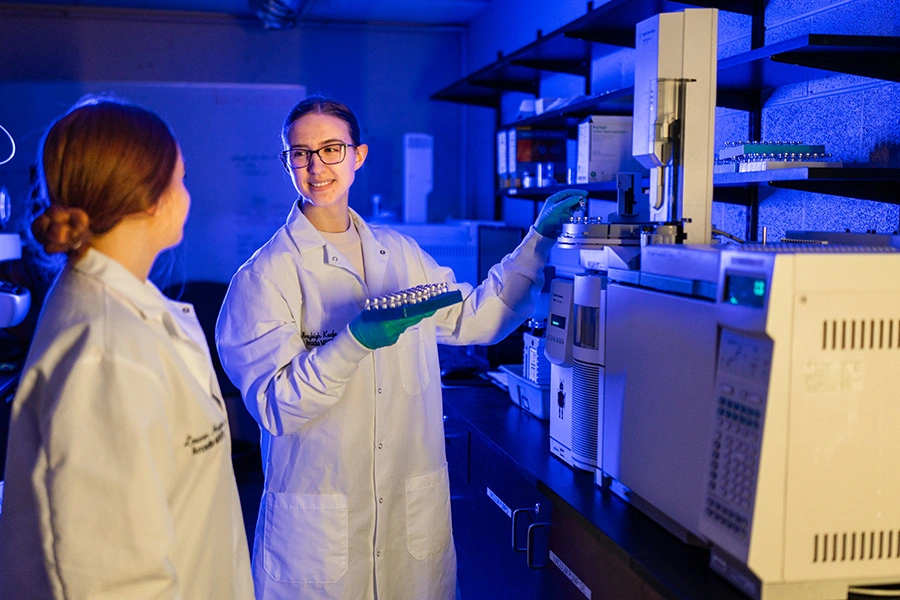Hands-On Forensic Science Laboratory Experience
The Master of Science in Forensic Science (MSFS) is offered by Arcadia University in partnership with the Center for Forensic Science Research and Education (CFSRE) and in collaboration with NMS Labs, one of the nation’s premier forensic science laboratories. Both facilities are about 10 minutes from Arcadia University in Horsham, PA. A portion of the coursework is conducted at the CFSRE facility, and forensic practitioners from NMS Labs provide part of the instruction.
Among forensic college programs, Arcadia is unique in its partnership with the CFSRE and association with NMS Labs, which is frequently involved in high-profile cases as well as serving the local law enforcement community. This professional alliance provides a source of adjunct instructors, a forensic library, invaluable links to the forensic science community, and state-of-the-art laboratory equipment and facilities.
Arcadia believes that hands-on forensic science experience is essential. Arcadia’s 12-credit guaranteed internship at the Center for Forensic Science Research and Education is a unique feature not available at other colleges with forensic science. This highly desirable, comprehensive, and intensive 14-week internal internship program gives every student valuable real-world experience and career preparation in one of three areas: Forensic Biology, Forensic Toxicology, and Forensic Chemistry. In addition, other external internships opportunities are available including NMS, Armed Forces DNA Identification Laboratory, Montgomery County Coroner’s Office, Philadelphia Police Department, and Philadelphia Medical Examiner’s Office to name a few.
Arcadia Forensic Science students take classes with renowned forensic scientists on site at the Center for Forensic Science Research and Education, where fully-equipped labs and smart classrooms provide a personal, hands-on learning experience. Interaction in forensic science laboratories with established researchers and practitioners, often involving case material, is a unique feature of Arcadia’s Forensic Science program. Students also have opportunities to conduct original forensic research.
Examples of capstone projects include:
- Method Development of a Quantitative Panel of Psychoactive Adulterants on Illicit Drugs of Abuse in Biological Matrices Using LC-MS/MS
- The Design of a Protocol for Detecting Trace DNA From Skin-to-Skin Contact in a Mock Physical Assault Scenario
- Exploring the Performance of an Initial Set of DIP-STR Markers for Biogeography Ancestry Prediction in U.S. Populations
- Body Fluid Identification From Mixed Samples and Male DNA Confirmation Utilizing SERATEC PSA and PMB Tests
- A Quantitative Confirmation Assay of New and Emerging Synthetic Cannabinoids by LC/QqQ/MS
- A Qualitative Analysis of Natural, Synthetic, and Semi-Synthetic Cannabinoids in Vape Products by GC/MS
- An Initial Investigation of the Applied BioSystems SeqStudioTM Genetic Analyzer for Human Identification Purposes
- Evaluation of the FORCE Panel on Alternative Reference Materials
- Evaluation of Urine Samples for Cannabidiol and ∆9-Tetrahydrocannabinol Content
Crime Scene House
The Crime Scene House (CSH) at Arcadia University is a multi-use facility managed by the Forensic Science Program. The facility provides a hands-on, realistic training environment to both undergraduate and graduate students studying criminal justice and forensic science. Students in the Forensic Science program principally use the space for their Crime Scene Investigation and Analysis class. The CSH is open for use by any department or student group at Arcadia and has also been utilized by local law enforcement agencies for training as well as school and community groups for enrichment activities.
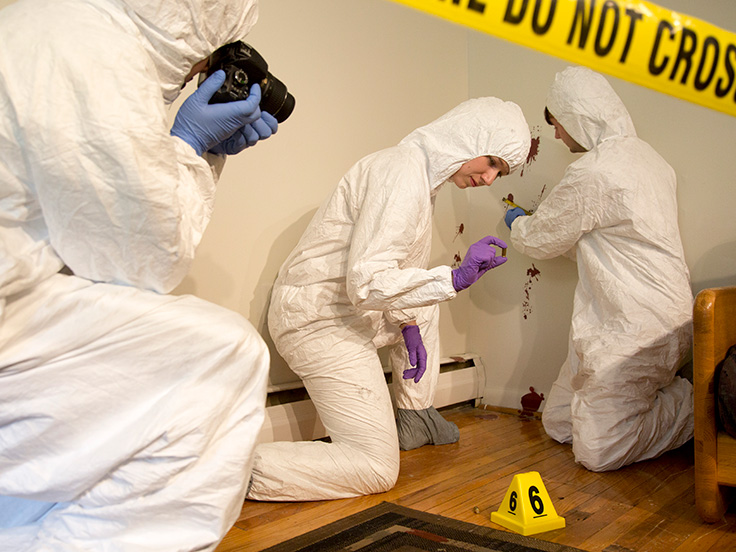
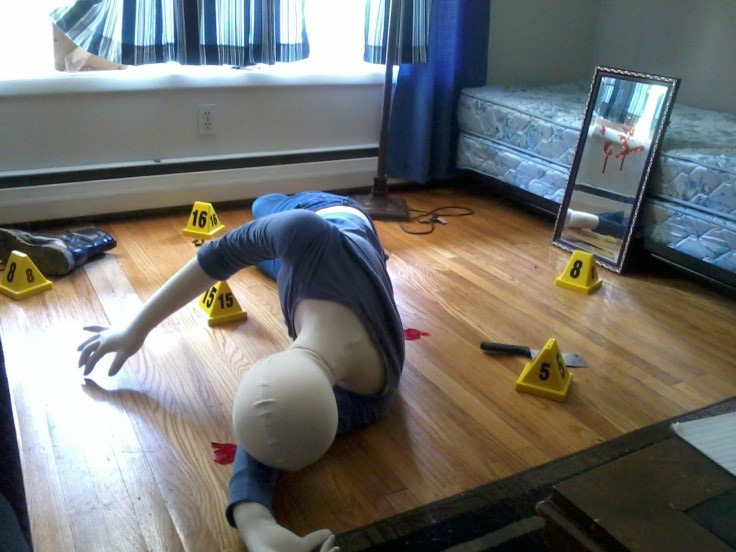
The CSH is located at 2063 Church Road and consists of a living room, dining room, kitchen, bathroom, and outdoor crime scene spaces. Also available is a dry lab area for processing evidence. The house comfortably handles groups of up to 25. Organizations interested in using the Crime Scene House should contact the director of the program.
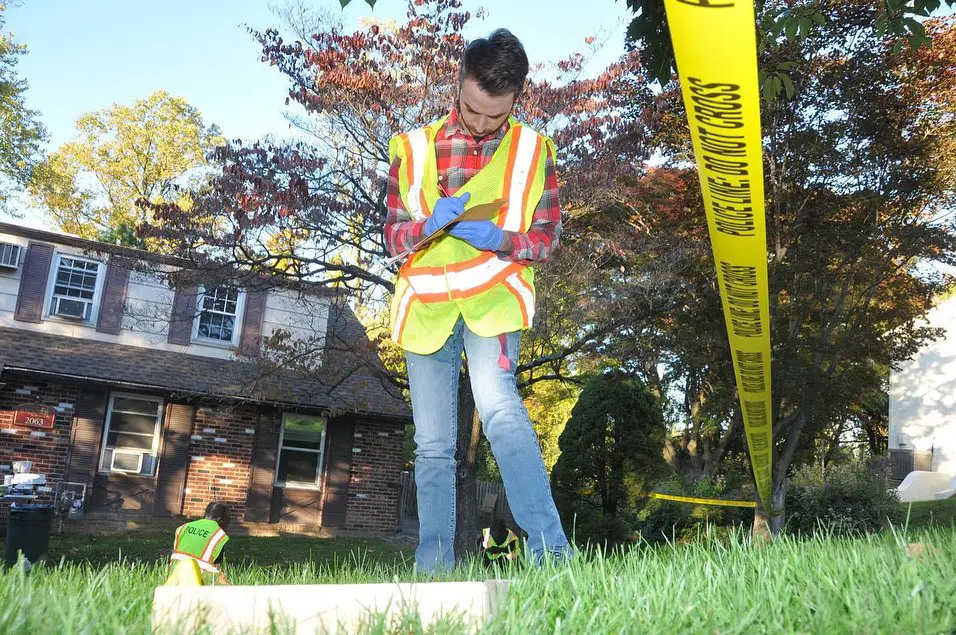
Forensic Biology/DNA Laboratory
The Forensic Biology/DNA laboratory is equipped with the latest instrumentations in the line of Applied Biosystems systems for conducting DNA testing. This analytical process consists of five main steps, including sample detection/collection, extraction, quantitation, amplification, and capillary electrophoresis.
Sample Detection/Collection
Alternative light sources are used primarily for enhancing the detection of evidence samples from crime scene specimens using filters of different colors.
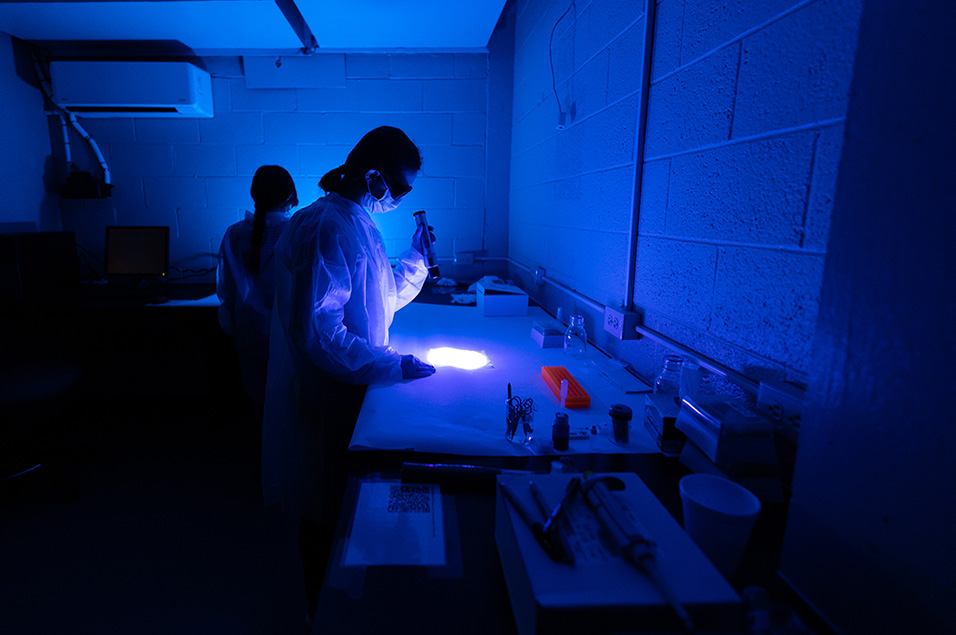
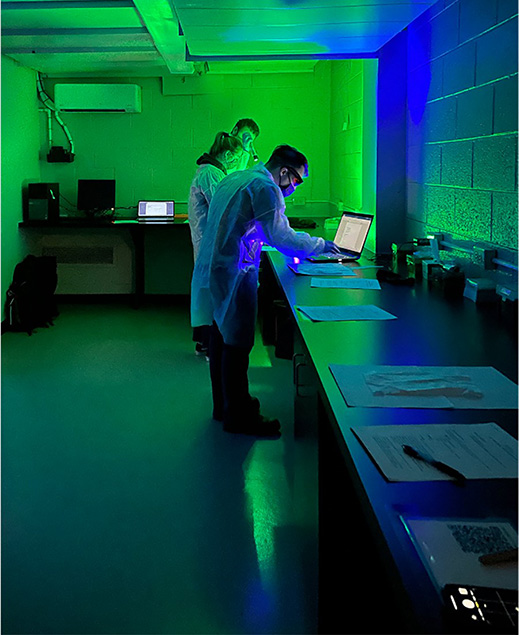
The laboratory is equipped with both LED forensic light sources used for the search of biological samples and different forensic serology-based kits for presumptive and confirmatory testing of body fluids.
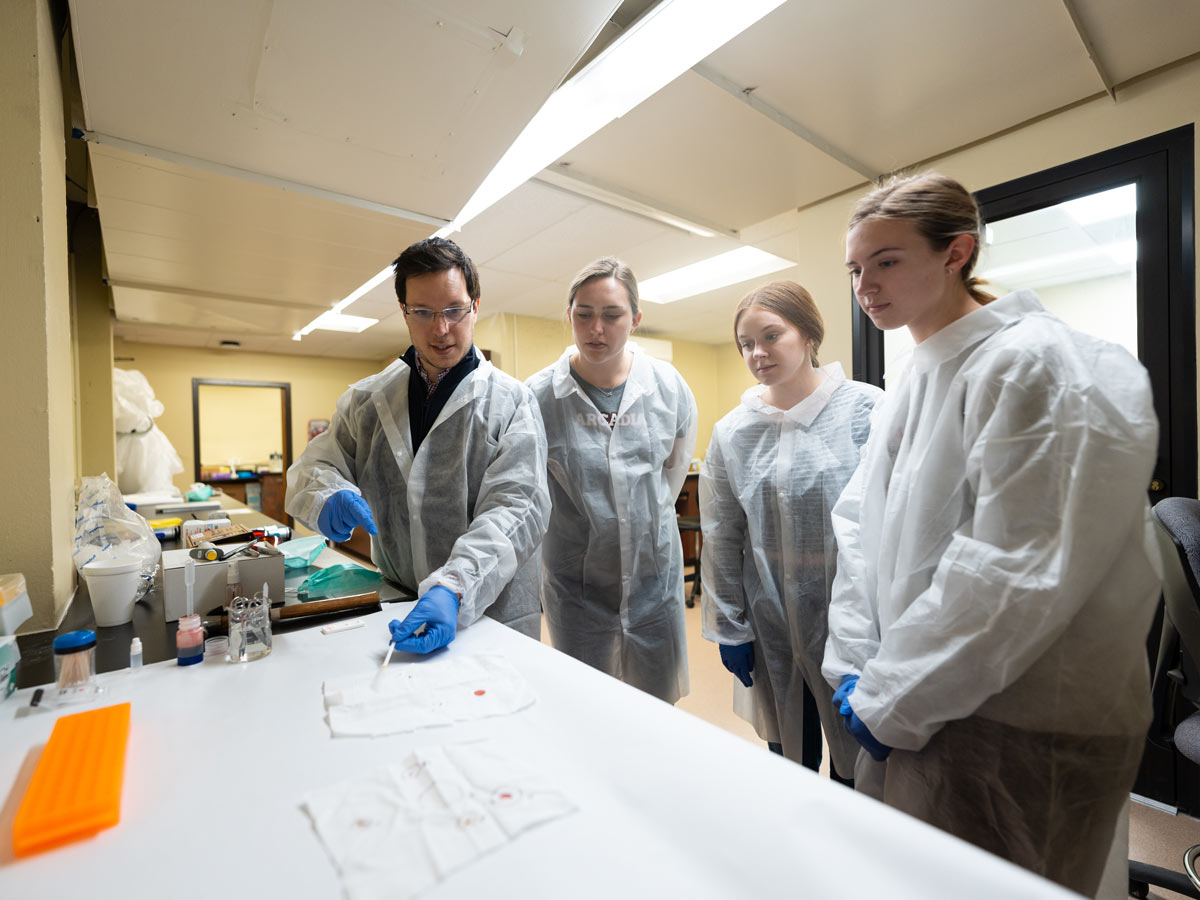
Extraction
DNA extraction is the key step toward the generation of DNA profiles utilized for human identity testing. DNA from different biological sources (i.e., body fluids or tissues) is extracted using a diverse array of DNA extraction kits, which our laboratory is equipped with.
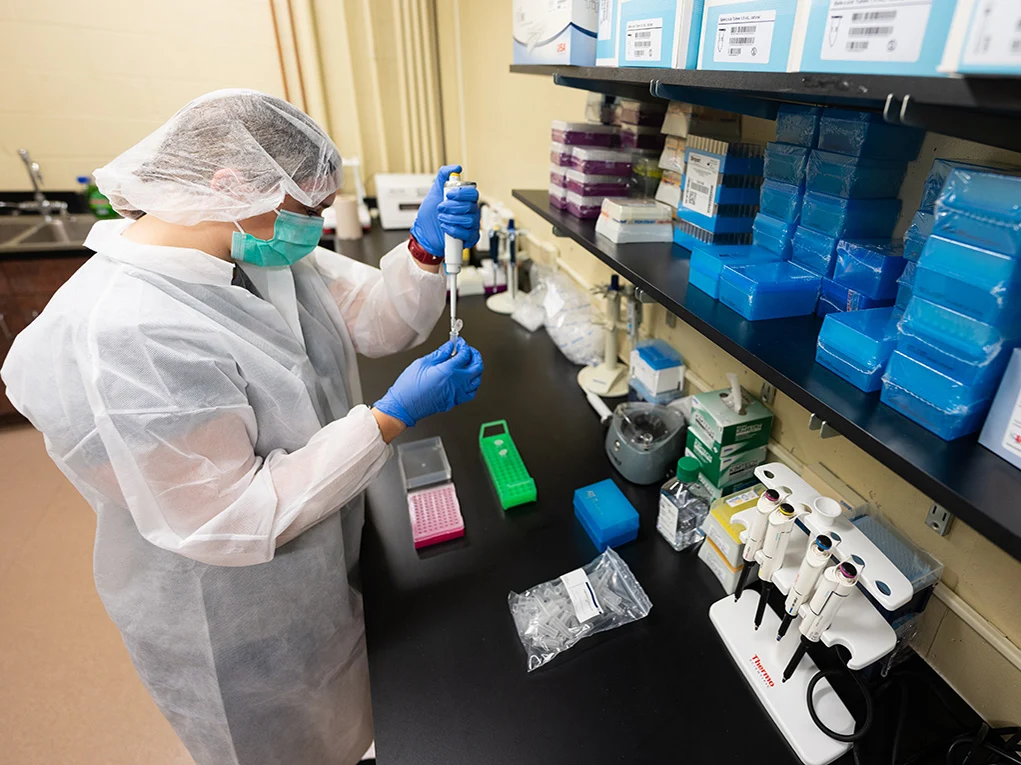
Quantitation
One of the required standards of forensic DNA testing laboratories is the quantitation of DNA, a process used for a wide range of forensic genomic applications that enables the determination of the amount of DNA present in an evidence sample. This is essential for success in the subsequent amplification step, which requires a narrow range of DNA input. The laboratory is equipped with the Applied Biosystems QuantStudio 5 Real-Time PCR System.
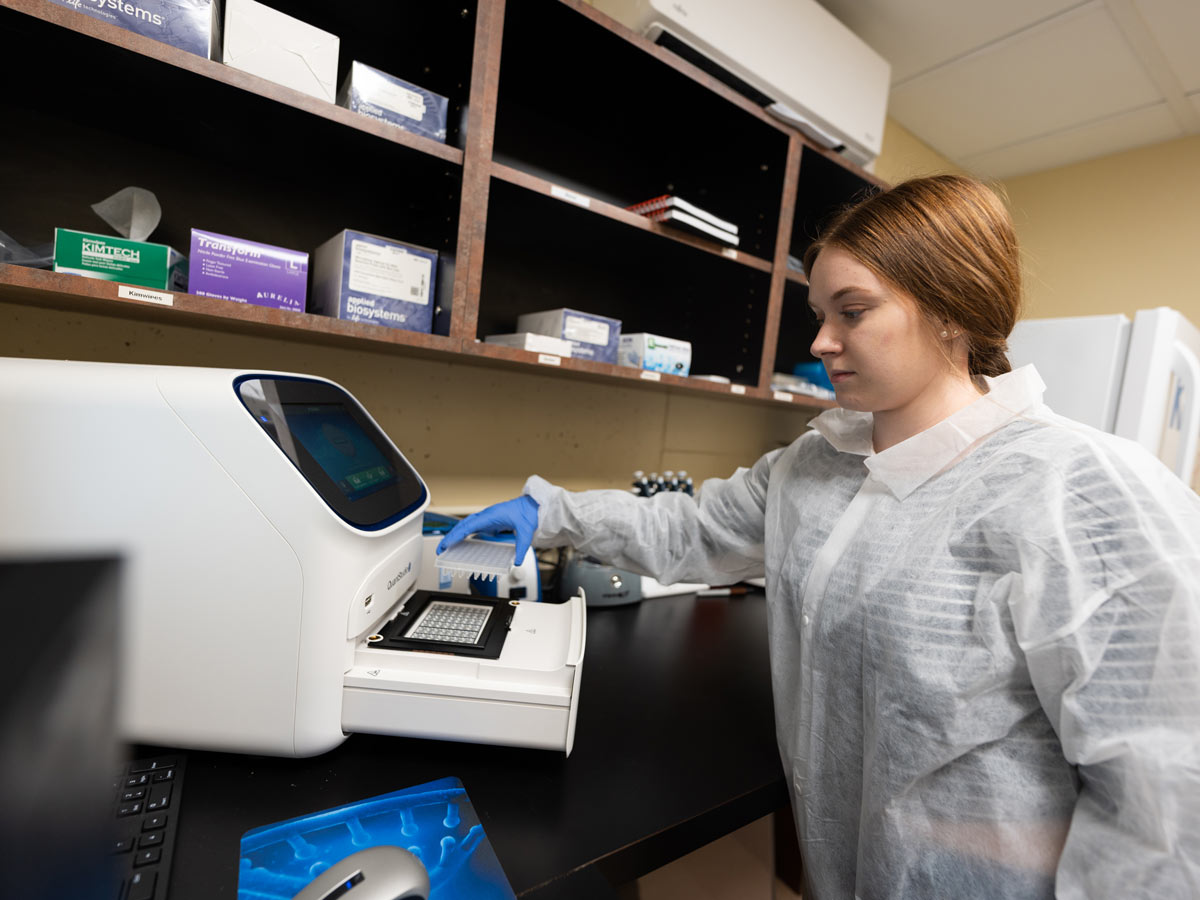
It is a high-performance instrument, which uses probe-based bioassays and intercalating dyes for the measurement of the amount of DNA in a sample. The HID Real-Time PCR Analysis Software v1.3 is used to optimize the quantitation workflow.
Amplification
Once the amount of DNA in a sample is determined, millions of copies of a specific sequence of DNA are generated through the Polymerase Chain Reaction (PCR) process. The PCR amplification step is performed using a diverse array of HID amplification kits on the latest ProFlex™ 96-Well PCR thermal cycler system.
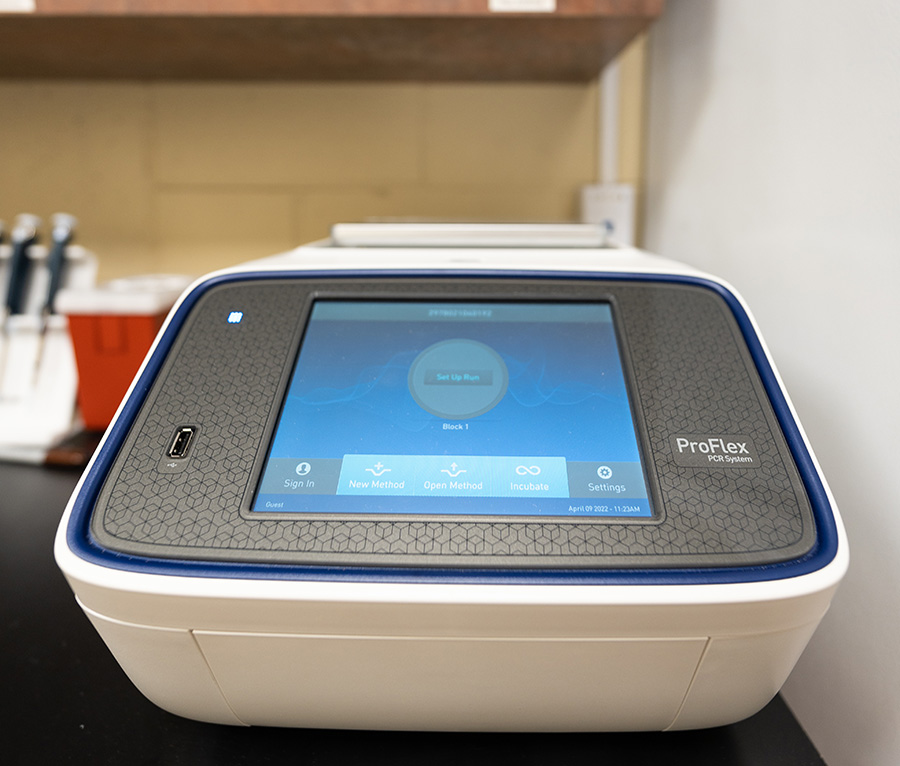
Capillary Electrophoresis (CE)
The PCR products are lastly separated by size through the capillary electrophoresis-based process. Our laboratory is equipped with the Applied Biosystems SeqStudio Genetic Analyzer.
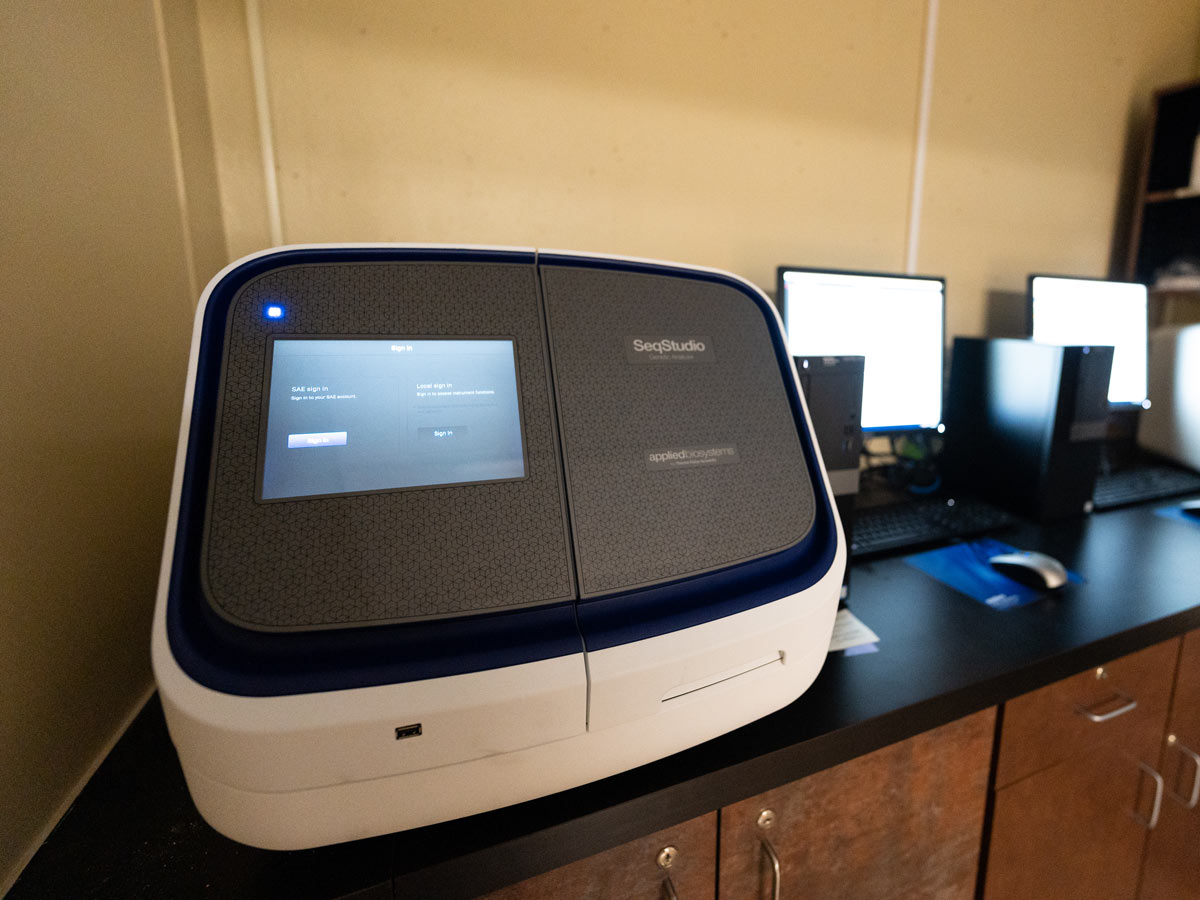
It is a 4-capillary and fluorescence-based CE system used for DNA fragment analysis and Sanger sequencing. The GeneMapper electrophoresis-based genotyping software package is then used for the analysis of DNA profiles.
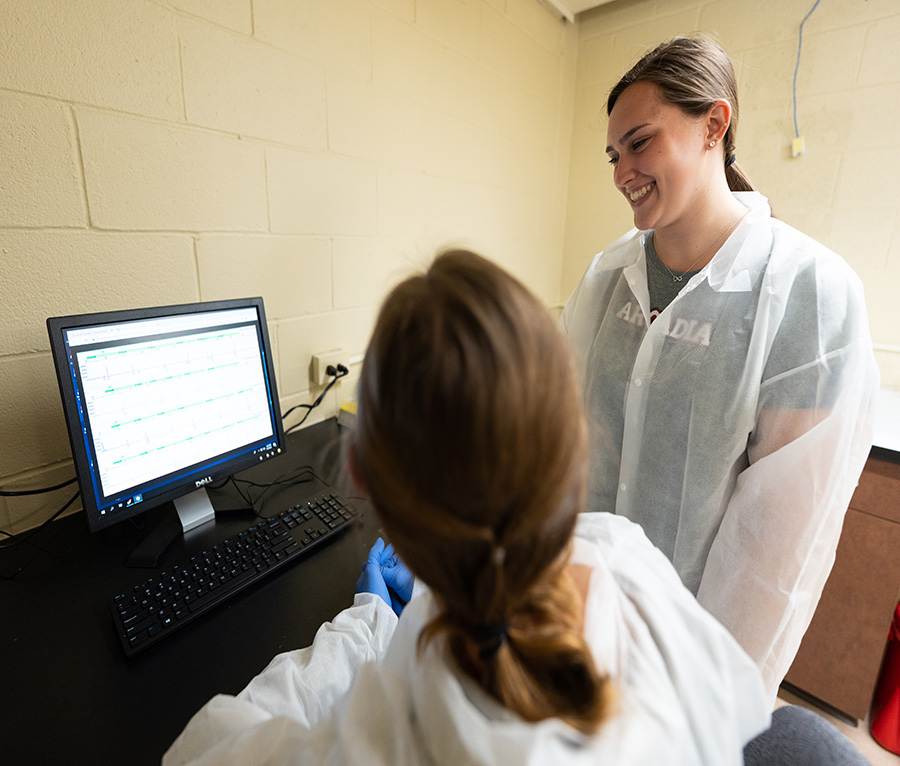
Trace Evidence Laboratory
Trace evidence analysis often deals with very small amounts of evidence that sometimes cannot be seen with the naked eye.
Crime Scene Investigation
Trace evidence analysis begins with the appropriate crime scene investigation techniques. Forensic photography and proper evidence collection techniques are practiced within the Crime Scene House (CSH) on our campus.
Microscopic Analysis of Trace Evidence
Following thorough documentation and evidence collection, the analysis of trace evidence often involves a preliminary examination of the evidence followed by microscopic analysis.
Trace evidence can include multiple types of evidence, such as fibers, hairs, explosive residues, bullets, and more. These pieces of evidence can all be analyzed using microscopes such as compound light microscopes, stereomicroscopes, polarized light microscopes, and fluorescence microscopes, all of which are on our campus. In addition, comparison microscopes allow for simultaneous analysis of a reference (known) item and questioned (unknown) evidence item.
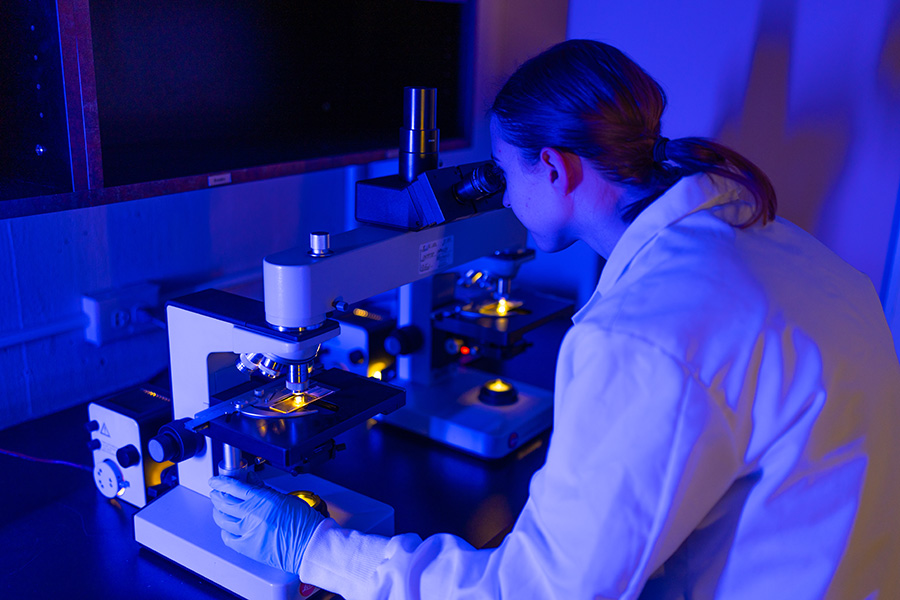
On our campus, we also have a stereomicroscope with a UV light attachment that allows for the analysis of trace evidence. Some evidence materials will fluoresce under UV light due to their chemical nature or makeup, allowing for a more in-depth, and sometimes discriminatory, analysis.
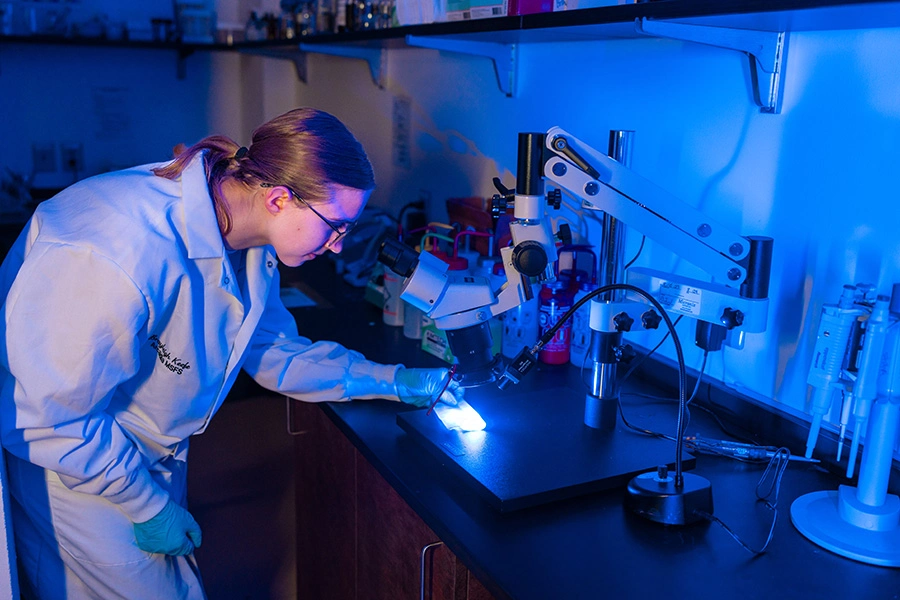
Confirmatory Testing
Our Fourier-Transform Infrared Spectroscopy (FTIR) instrument allows for the confirmation of the presence of the chemical material that makes up a piece of trace evidence. It identifies chemical compounds based on their chemical structure/conformation. This instrument can be especially useful for certain fiber analyses and for explosive residues such as gunpowder.
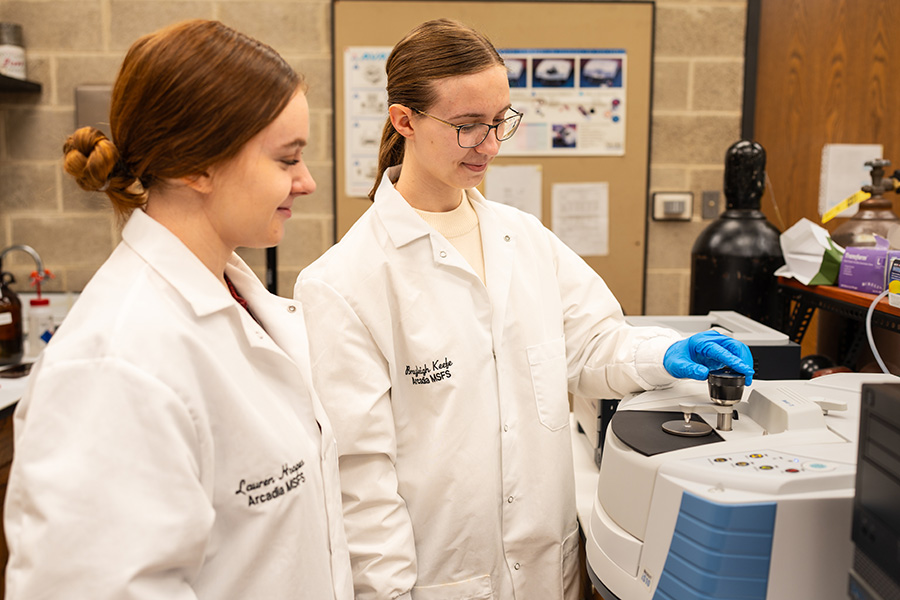
Forensic Toxicology Laboratory
Forensic toxicology is the analysis of biological matrices (such as blood or urine) for the presence of drugs or other chemical compounds.
Sample Preparation and Extraction
To analyze most biological samples, however, they must go through a sample preparation and extraction process. This involves isolating the drugs from the biological matrix for an improved analysis on gas chromatography (GC) or liquid chromatography (LC) instrumentation. Two common examples of extraction techniques used in forensic toxicology include solid-phase extraction (SPE) and liquid-liquid extraction (LLE). After extracting the drugs of interest out of the biological matrix, the drugs will be more concentrated, matrix interferences (such as proteins and lipids) will be removed, and the samples will be amenable for instrumental analysis.
Presumptive Testing and Screening of Toxicological Samples
Gas chromatography (GC) (and liquid chromatography (LC)), both of which we have at Arcadia, can both be used as a screening tool to detect the possible presence of a drug in a biological matrix (following extraction). This presumptive testing allows the analyst to determine what compounds may be potentially present in their sample and to tailor their further confirmatory analysis to look for these potential compounds.
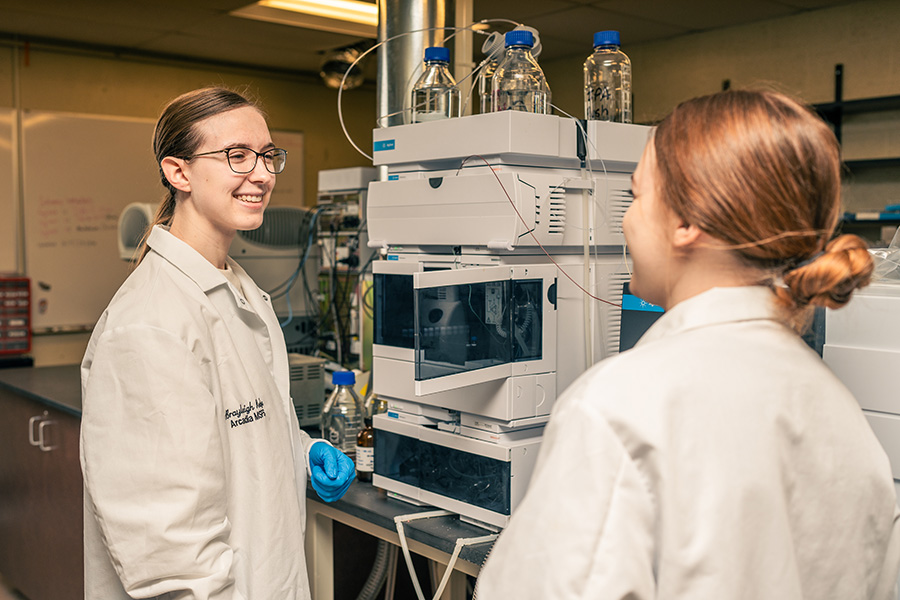
Confirmatory Testing
Following sample preparation/extraction and presumptive screening of toxicological samples, gas chromatography and/or liquid chromatography coupled with a mass spectrometer can be used to confirm the presence of drugs in a sample. Mass spectrometry coupled with gas or liquid chromatography instrumentation allows for both chromatographic separation and structural identification of drugs, as each drug has a unique and predictable fragmentation pattern. Overall, confirmatory testing allows the analyst to confirm the presence of drug(s) in a sample based on its chemical structure.
Data Analysis
After a sample undergoes both presumptive and confirmatory testing, data analysis must take place. The data acquired from the instruments used can provide qualitative results and/or quantitative results leading to the conclusion of the type and/or “amount” of drug(s) in a toxicological sample.
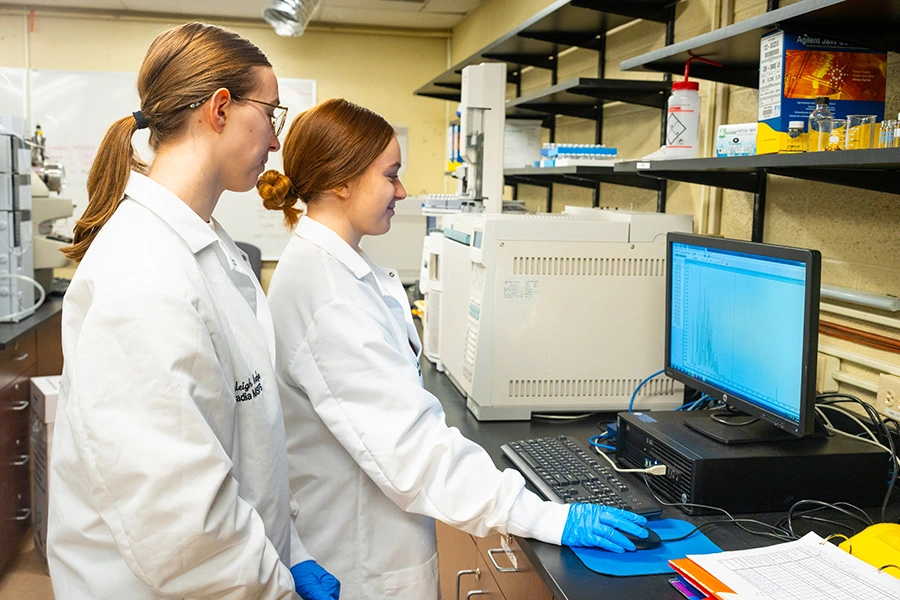
Forensic Chemistry Laboratory
Forensic chemistry involves the analysis of forensic evidence materials for the presence of drugs. This can include examples such as unknown powders, unknown plant material, etc. Before beginning all types of forensic chemistry analysis, all evidence is photographed, documented, described in detail, weighed, and a chain of custody is established and maintained. At Arcadia, we learn all of the important steps of processing and working through a real forensic case. This produces highly qualified scientists who are properly trained in forensic evidence workflow.
Preliminary Testing
In forensic chemistry, preliminary testing for possible drugs or other chemical substances can include color testing, thin-layer chromatography (TLC), and microscopy. In addition, in cases where volatile substances or alcohols are involved, a Gas Chromatography/Flame Ignition Detector (GC/FID) can be used, which will portray any presumptive presence of these compounds. Our GC is also capable of producing presumptive screening results. The results of presumptive testing allow the analyst to have an idea of what compounds may be in their sample and tailor their confirmatory testing toward those specific potential compounds of interest.
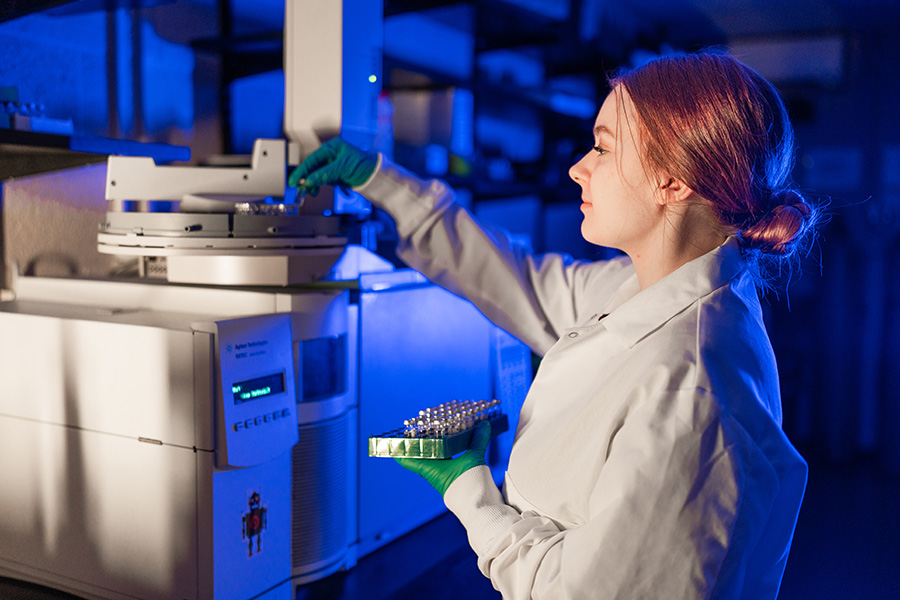
Confirmatory Testing
Multiple types of instrumentation can be used for confirmatory testing of evidence materials in forensic chemistry. At Arcadia, we have two of the most used forensic chemistry instruments such as GC/MS and FTIR. Our laboratory’s GC/MS, LC/MS/MS, FTIR, and microscopes are all instruments of immeasurable importance for forensic chemistry and toxicology practices. These instruments can produce both presumptive and confirmatory results allowing an analyst to conclude about the contents of an unknown forensic sample.
